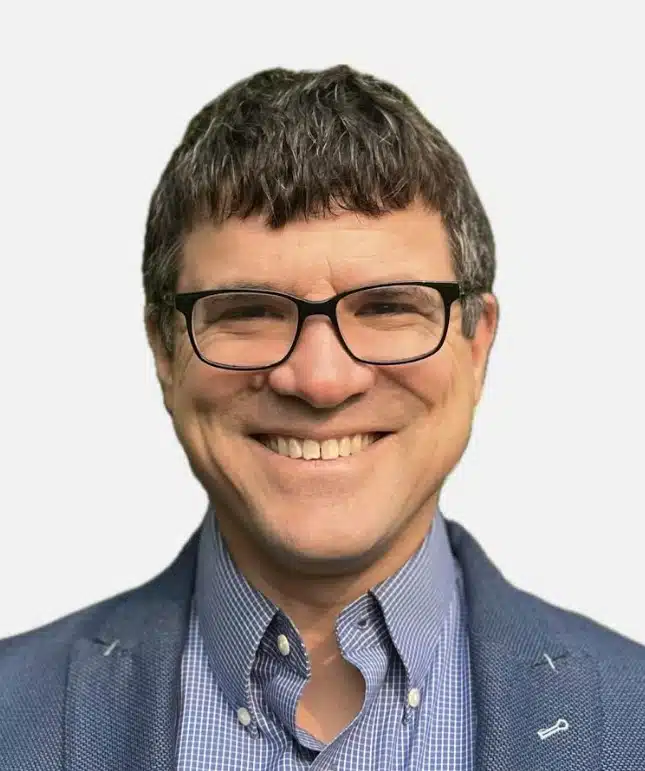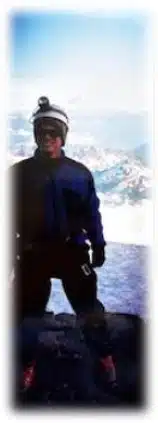Rick, Hodgkin Lymphoma
Rick, Hodgkin Lymphoma
Every good story starts somewhere and this one starts on a wrestling mat. Sweat, blood, dreams … joy and heartbreak – what I would give to wrestle at state again. My wrestling days ended more than 30 years ago; left behind along with a thousand high school memories, adolescent behaviors, and dreams for my life’s journey. I entered college like most of my childhood peers thirsty for independence and drunk on freedom. It took four hours to drive from my boyhood home to college, the University of Wisconsin – Eau Claire, but that drive seemed intercontinental. My territory.
As the first semester slogged on, my health changed. Something felt “off.” Not like the flu, but rather like fatigue. My energy dropped; I chalked it up to wearing down after my first semester. Over winter break, these symptoms continued and my mother took me to an urgent care doctor. This doctor diagnosed me with mono, and prescribed rest and fluids. What teenager doesn’t like sitting around drinking fluids?
I returned to college and started the spring semester. Eight weeks later, I returned home for spring break and my mother put her hands on my neck. “Oh my God, how long has it been like this?!” she asked. My mom worked as an oncology nurse and hid her concern, but knew potentially what grew therein.

An hour later, I sat on my pediatrician’s exam table and the day after, on an operating table as a doctor performed a neck biopsy. Folks, this was 1994 and I was 19. Ubiquitous information, the internet, WebMD, etc. – none of it existed. I didn’t know why I underwent a biopsy, I only knew I had a huge bandage and returned to school and wore it proudly. “I had a biopsy!” I boldly told people. I had no idea.
Tuesday evening. I sat in my dorm room microwaving my dinner. A knock sounded at the door. I opened it. My parents. Tears. Fogged glasses. “Rick, son, you have Hodgkin’s Disease.”
A week away from school and a battery of tests, scans, and appointments confirmed a diagnosis of Stage 2B Hodgkin’s Disease, now known as Hodgkin lymphoma. Fortunately, I could return to college and undergo radiation treatment at Sacred Heart, the hospital directly next to campus.
Of course, I didn’t want anyone to know and I did not want to be the “cancer guy” on my campus. I told my boss and one friend and no one else. Shortly after spring break, I would walk from my dorm room, to the hospital, and undergo radiation treatment. I made all of these walks, alone.
Upon completion, fresh scans confirmed no evidence of disease (Uncle NED). I slept off the aftereffects of radiation all summer and returned to college that fall semester, free of cancer. No one the wiser. And it stayed that way, for 18 months.
Strange symptoms returned and one scan led to another which led to another biopsy (and I knew what a biopsy was this time). “If it’s bad news, just call me!” I yelled at my mother through the phone, “I don’t want another big scene at my door.” And she did just that 48 hours later confirming, “Rick, it’s back.”
I couldn’t hide it this time, I dropped out of school and moved all of my stuff and my diseased body back into my parents’ home. People knew.
Eight months of ABVD chemo and 22 radiation treatments sapped my body of all strength and at my lowest, I could not walk up a flight of stairs. All of these brutal treatments led to July 31, 1996. That day, my cancerversary, I welcomed Uncle NED back and he’s stayed with me (thanks to God) ever since.
Returning to school and life, people looked at me like I was a ghost.
“Dude, I thought you died!” I heard more than once. I became a survivor and like so many of us on this journey, took steps without a map, left the regular structure of appointments with my care team, and moved forward with paralyzing fear that cancer would come back again a third time. “Scanxiety”, they call this now; back then I called it being scared s—tless.
Dear reader, what do you want more than anything? I’ll answer: you want back what’s been taken from you. Prospect theory tells us that the strength of the feeling of loss burns much more intensely than the joy of winning. I lost my athletic ability. I lost my identity. I lost me.
That anger never went away. So, I channeled it back into my body. I started slowly. I could not run 200 yards when I started. By consistently putting on my exercise clothes and trying day after day, my runs got longer and eventually covered a whole mile. Nothing would stop this progress; nothing would stop this violent rebalancing of what cancer took. I. Would. Not. Quit. Period.
A year later, I had a college internship and made a business trip to Seattle. Over a weekend, I visited the observation platform on Mt. Rainier. I looked through the 25₵ binoculars and saw a group of climbers pushing to the summit. Tears filled my eyes watching them and picturing myself alongside them. What a way to violently rebalance the scale and take back my body from cancer.
I could not get Mt. Rainier out of my mind and for the next few years, kept training with the faith that my body would eventually bounce back. At three years removed from chemo, I could handle regular exercise and longer runs. I could not shake the idea of making this climb, so I signed up with Rainier Mountaineering. They sent me a video (on a VHS tape) of the training and people climbing the mountain and I watched it daily, the fire inside me burning to make this climb.
The mountain kept calling me and would not stop. It stoked a myopic focus on getting to the summit, to complete the rebalancing act. Every step, every run, every lift, every hike, every heavy backpack put me closer to the top and further from cancer.
I returned to Seattle and made my way to the guide shack of Rainier Mountaineering. The climbing group of about 50 came together and introduced ourselves. Many of the others came from California or the west coast, and were most worried about the temperature. “I’m Rick. I’m from Wisconsin. I’m not worried about the cold!” I said. They all laughed. I did not tell them my real story or that I beat cancer in fear they would not let me climb.

And we set out into the bright mountain air. Marmots dotted the landscape. Soon we stood above the treeline, and eventually at base camp, Camp Muir, at 10,000 feet for an overnight in a wooden hut. The next morning, we set off after an early alpine start around 2:00 am. We climbed with headlamps in the dark. After hours of climbing the Disappointment Clever route, the sun rose and filled 180 degrees of the brilliant horizon. The most beautiful sunrise I have ever seen…a reward for making this journey. And we pressed onwards.
“Two hundred yards,” a voice boomed above me. My tears clogged my ears, the wind swept them from my eyes. My goggles fogged. Soon I saw a hand extended into my chest. “Congratulations on summiting Mt. Rainier,” our guide, the legendary Robert Link, said to me as he shook my hand. I could not stop crying.
Cancer drove me to push my body harder and beyond my limits. With Mt. Rainier down, I wanted my athletic resume to read like a middle finger to cancer. I swam 12 total Alcatraz crossings, I swam the Golden Gate channel, I ran the Boston Marathon, and I completed several 150-mile bike rides.
Dear reader, if you’re still hanging in there and have made it this far, know this: we are only here for a short amount of time. If you’re on your first, second, third, or beyond chances at life, get out there and follow your dreams.
Find your passion.
Say the things you need to say.
Repair what’s broken.
Leave something behind.
Make your comeback.
Live your story.
Author and motivational speaker, Rick Czaplewski, had cancer 27 years ago. His book Better Dirty Than Done about his experience with cancer is available on Amazon, Kindle, and Spotify.
